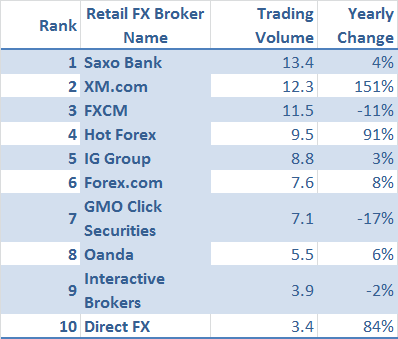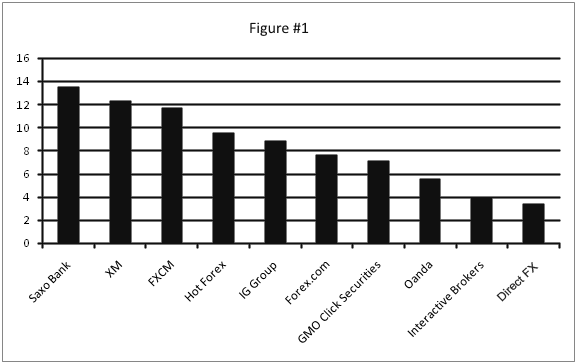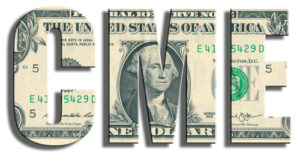 As the world’s largest financial market, the foreign exchange market easily dwarfs all other markets including the stock, bond and commodity markets by a substantial margin. The currency market includes transactions in spot forex currency pairs, forward contracts, currency futures, OTC currency options, and exchange traded options on currency futures.
As the world’s largest financial market, the foreign exchange market easily dwarfs all other markets including the stock, bond and commodity markets by a substantial margin. The currency market includes transactions in spot forex currency pairs, forward contracts, currency futures, OTC currency options, and exchange traded options on currency futures.
In addition to its derivative markets, the forex market is composed of three primary segments: the Interbank market, the retail market and the exchange traded futures market. Each of these segments in turn has a number of market participant types that primarily use that segment to execute currency transactions.
The following sections will describe each currency market segment and the nature of its primary participants. We will mention some specific traders and financial institutions that have created a name for themselves within each particular market segment.
The Interbank Forex Market
The over the counter or OTC Interbank forex market consists of a loose and largely unregulated group of financial institutions that deal currencies among themselves and make exchange rate quotations to clients. In the Interbank market, the term “market maker” commonly refers both to the large financial institution that makes prices to others, as well as to the individual who works at such an institution and who is personally responsible for making such quotes.
The larger among these financial institutions typically act as market makers who provide forex rate quotes to each other, Interbank brokers and clients. In contrast, the smaller financial institutions, corporations, fund managers and high net worth individuals who participate in the Interbank market tend to act as clients to the large market makers.
Although electronic forex dealing services and markets are available, they are largely used among the market makers themselves, while Interbank forex brokers primarily negotiate deals between market makers verbally via telephones and call boxes.
Most clients of these large financial institutions will get forex quotes from the market makers by making a telephone call to the customer dealing desk of the large financial institution that the market maker works at. The customer service person then verbally requests a quotation from the market marker in the relevant currency pair working on the trading desk. Forex transactions are generally done using credit lines that counterparties extend to each other, rather than on a margin basis.
The Primary Interbank Currency Market Participants
The list below gives some additional details about the main foreign exchange market participants operating in the Interbank forex market:
- Interbank Market Makers – These are typically large commercial and investment banks that make foreign exchange quotes to other market makers and to some bigger clients.
- Interbank Forex Brokers – These act as intermediaries to arrange forex deals between Interbank market makers. They usually offer a phone service and a call box service where a person provides a steady stream of verbal quotations for forex rates in the major currency pairs.
- Interbank Electronic Forex Brokers – These include the Electronic Broking Services or EBS and the Thomson Reuters Dealing service. They both provide electronic brokering platforms for Interbank counterparties to use.
- Central Banks – These are the national financial institutions that oversee and manage the currency of their respective countries. They maintain currency reserves, and can intervene in the forex market to defend or weaken their national currency as they deem appropriate. Examples are The Federal Reserve Bank, The Banks of England, Japan and Canada, The Reserve Banks of Australia and New Zealand, the Swiss National Bank and the European Central Bank.
- Smaller Financial Institutions – These consist of smaller banks that might be trading forex for themselves or executing deals on behalf of clients, as well as investment funds. They each typically act as clients of the large market makers.
- Hedge Funds – These funds employ traders who actively speculate in the forex market and act as clients of large market makers. Some hedge funds execute trades automatically on an algorithmic basis.
- Multinational Corporations – These companies are not in the business of trading forex, but are typically hedging and managing the currency risks that arise as a result of their fundamental commercial activities.
- High Net Worth Individuals – These are personal currency traders who are creditworthy enough and deal in large enough size that they can to execute trades with the customer desks of market making institutions. Some of these people are hedging personal currency risks that might arise from holdings abroad, while others like the challenge of speculating in the forex market for profit.
Large Interbank Forex Market Players
The biggest currency market traders operating in the Interbank forex market tend to work at major commercial and investment banks. They collectively provide considerable liquidity to the currency market by providing bid ask prices to clients, as well as speculating for their banks’ proprietary trading accounts.
Some of the largest names among these big institutional forex market players include: Deutche Bank, UBS, Citigroup, Bank of America, Goldman Sachs and HSBC.
Big Foreign Exchange Traders
Due to its massive size, impressive liquidity and relative stability, the forex market has attracted a number of high net worth individual traders, proprietary bank traders, and hedge fund operators who have made a collective mint trading currencies speculatively.
Some of the better known among these currency trading giants include:
- George Soros – A billionaire currency speculator and philanthropist who helped “break” the Bank of England by betting against it remaining in the European Monetary System and causing the eventual devaluation of the Pound Sterling as it was forced to exit that fixed exchange rate system.
- Bill Lipschutz – A well-known forex trader, mathematician and financial expert who reportedly earned over $300 million trading forex in a single year.
- Stanley Druckenmiller – A protégé of Soros, Druckenmiller founded Duquesne Capital Management that activity trades currencies.
- Andrew Krieger – As a young trader at Banker’s Trust, he famously bet big against the New Zealand Dollar and made $300 million for his bank. He then worked for the Soros Management Fund and now operates though Northbridge Capital Management.
Each foreign exchange trader mentioned above comes from a different educational background, although many of them worked for George Soros, who really seems to know what makes a currency player successful and appears to have the rare ability to communicate it to the brightest traders who work for him.
The Retail Forex Market
The retail forex market is primarily made up of individual speculators that trade on margin deposited in a trading account with an online forex broker using an electronic trading platform like MetaTrader, for example. In addition to individual traders, retail market participants also include tourists, travelers and students that travel or study outside of the country of origin.
The great majority of retail forex participants typically trade currencies online through one of many online forex brokers and Introducing brokers. These retail forex market participants typically trade in small amounts that can range from micro to standard lot sizes, with the standard lot size usually consisting of 100,000 units of the base currency in a currency pair.
The Major Retail Forex Market Participants
A large percentage of the retail forex market is made up of individual speculators that take on relatively small positions in their online forex broker margin accounts. Nevertheless, while the retail forex market has grown exponentially with the advent of online trading, it still only represents a small fraction of total forex trading volume.
Below are listed the major players in the retail forex market:
- Online Forex Brokers – The online forex brokerage market has exploded in the last few years, with hundreds of forex brokers currently operating on the worldwide web. These brokers operate in the over the counter or OTC market and are not subject to the same regulations as other financial markets. A number of regulating agencies such as the Financial Conduct Authority in the UK and the Cyprus Securities and Exchange Commission or CySEC in the European Union have oversight on many European based online forex brokers.
- Introducing Brokers – An Introducing Broker or IB is basically an agent that introduces new customers to a forex broker. For sending clients to the forex brokerage, the Introducing broker receives a fee, which is typically a portion of the dealer spread or commission charged by the forex broker. Certain countries, such as the United States, require by law that Introducing Brokerages be regulated firms. For an Introducing Broker to operate in the United States, they must be regulated by the National Futures Association in order to solicit business from U.S. residents. Nevertheless, no such requirement exists within the European Union.
- Retail Forex Traders – This portion of the forex market is made up of all of the retail forex broker’s clientele, which include speculators and traders ranging from small to very large. These traders tend to be speculators that bank on short-term movements in currency pairs to make a profit. The number of speculators typically increases as market volatility increases.
Large Retail FX Market Players
Retail forex traders tend to operate in small transaction amounts relative to those dealt in the Interbank market. The major forex players operating in the retail forex market tend to be the online forex brokers that cater to such clients. The following table shows the largest retail forex brokers by trading volume in billions of U.S. Dollars that was measured for each broker over a month and a half period starting on July 1st of 2016.

These trading volume numbers are displayed graphically in the bar chart shown below in Figure #1 along the vertical axis in billions of U.S. Dollars per trading day.

The Exchange Traded Forex Futures Market
Futures contracts on currencies have been available for trading since the late 1970s through the International Monetary Market or IMM of the Chicago Mercantile Exchange. In addition to exchange traded futures on currencies, the exchange offers other derivatives like options on the futures contracts. Electronic trading on both futures and options can take place when the live exchange market in Chicago is closed.
Each of the IMM currency futures contracts are quoted in U.S. Dollars, which is therefore the base currency for all forex futures transactions dealt on that exchange. Also, the futures contracts for different currencies have different denominations. For example, a futures contract for British Pounds is for 62,500 British Pounds, while the futures contract for the Euro is for 125,000 units of the foreign currency.
 The Primary Currency Futures Market Participants
The Primary Currency Futures Market Participants
While the exchange traded currency futures market seems relatively small when compared to the huge size of the overall foreign exchange market, the forex futures market plays an important role for commercial traders and speculators alike. Hedgers make up a large portion of forex futures traders, and individuals, financial institutions and corporations are all able to use the futures market to hedge their spot and forward foreign exchange exposures.
The major participants in the forex futures market include:
- The Chicago IMM Futures Exchange – Founded in 1972 when the International Monetary Market merged with the Chicago Mercantile Exchange, this institution has been at the forefront of the forex futures industry. In addition to its GLOBEX automated trading system, which allows trading in futures for extended hours, the IMM also offers trading in other financial instruments such as interest rate futures, currency options, futures on the LIBOR Rate and the U.S. Consumer Price Index, to name just a few.
- Specialist Market Makers – These traders specialize in offering liquidity to other traders and financial institutions in the currency market. Many large financial institutions and commercial banks have market makers in their foreign exchange departments. Often the Specialist Market Makers will offset their forex positions immediately after the trade takes place with another spot transaction, a forward trade or a futures position.
- Commercial Traders – Another example of a hedge trader, the Commercial Trader generally works in the foreign exchange department of a large corporation and oversees international transactions made by the company, as well as converting foreign currency into the domestic currency of the company. They may also hedge translation and contract forex exposures.
- Non-Commercial Traders – A large number of individual traders and speculators also trade in the forex futures market, including the local traders of the IMM. These traders take speculative futures positions much like traders in the spot market, with the primary difference being that within the futures market, one can be assigned delivery by the seller of the futures contract upon the futures contract maturing if they do not roll the contract forward into a subsequent delivery date.
- Arbitrageurs and Algorithmic Traders – These traders often create or operate electronic trading systems that deal automatically or watch for favorable arbitrage opportunities where they buy in one market and sell in another. Such trading systems can quickly execute very large transactions automatically according to the algorithm programmed into the system, and they help to close up any potentially profitable gaps between the futures and spot forex markets.
Large Currency Futures Traders
By far, the main players in the forex futures market are made up of large commercial banks, hedge funds and the central banks of the countries where the currency originates.
Large commercial banks might use the currency futures market to offset positions they take on from clients, as well as to establish speculative positions for large individual traders and sometimes even for the bank’s own trading book. Hedge funds are also known to take on large speculative positions in the futures market, which they later unwind for either large gains or losses.
Arbitrageurs play an important role in keeping the spot forex and currency futures market consistent with each other and can often deal in very large transaction sizes.
When discrepancies arise in the currency market between the Interbank spot market and the currency futures market, whether as a result of economic data releases that differ substantially from market expectations or unanticipated geopolitical events, an arbitrage may exist between those markets that some savvy traders watch for and quickly bring back into line.
When doing such arbitrages to perfectly square off a spot transaction with a futures contract, a forex swap from spot out to the futures delivery date will also need to be executed in the same currency amount.
Furthermore, when a nation’s currency is showing extreme fluctuations — or strong directional behavior that results in new highs or lows — that country’s central bank will often become active in the forex market to help calm volatile markets and dampen trends. Their activity might include participating in the futures market, as well as the spot market, with the objective of reestablishing stability and an orderly market in situations where forex market volatility has reached extreme levels.